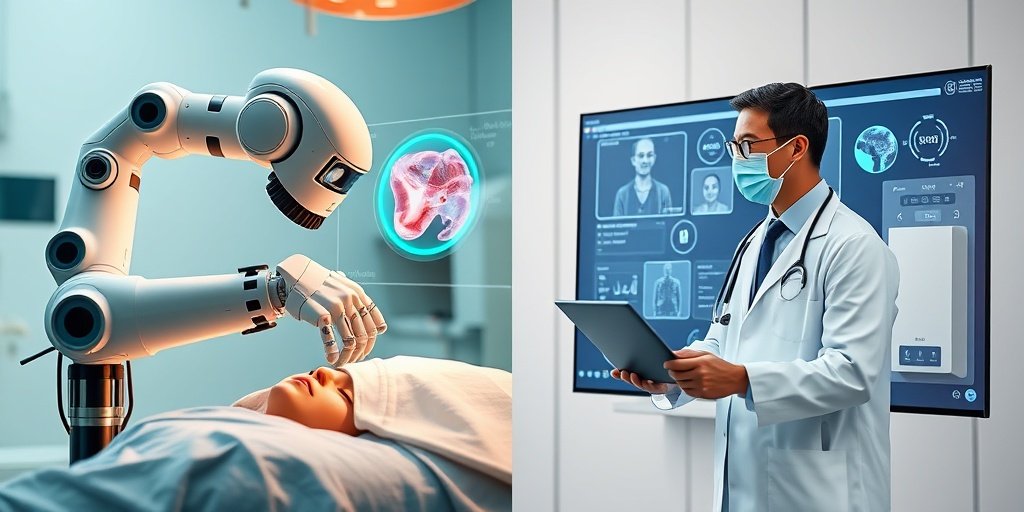⚡ Quick Summary
This article explores the transformative role of cutting-edge technology in healthcare, highlighting advancements such as AI in medical imaging, robotic surgery, and telemedicine. It also addresses the ethical challenges and future research directions necessary for responsible technology adoption.
🔍 Key Details
- 📊 Technologies discussed: AI, robotic surgery, telemedicine, personalized medicine, blockchain
- 🧩 Case studies: AI in radiology, robotic surgery accuracy, blockchain in electronic health records
- ⚙️ Ethical issues: Data privacy, algorithmic bias, patient consent, regulatory challenges
- 🌐 Target audience: Policymakers, researchers, healthcare practitioners
🔑 Key Takeaways
- 🤖 AI is revolutionizing medical imaging for early disease detection.
- 🏥 Robotic surgery enhances precision and minimizes invasiveness.
- 📱 Telemedicine facilitates remote monitoring and virtual consultations.
- 🧬 Personalized medicine leverages genomic analysis for tailored treatments.
- 🔒 Blockchain ensures secure and transparent health data management.
- ⚖️ Ethical considerations are crucial for technology integration in healthcare.
- 🔍 Future research should focus on interdisciplinary cooperation and effective cybersecurity.
- 📈 Policy transformations are needed to support the ethical adoption of digital health solutions.

📚 Background
The integration of technology in healthcare has significantly altered patient care processes, diagnosis, and treatment outcomes. With advancements in various technological fields, healthcare is on the brink of a major transformation that promises to enhance both efficiency and effectiveness in patient management.
🗒️ Study
This paper discusses the high-level integration of technology in healthcare, focusing on key advancements such as AI for medical imaging, robotic surgery, and telemedicine. Each section elaborates on the principles, advantages, and disadvantages of these technologies, supported by relevant case studies that illustrate their practical applications.
📈 Results
The findings indicate that technologies like AI can significantly enhance diagnostic accuracy, as seen in the deployment of AI in radiology for cancer detection. Similarly, robotic surgery has shown improved accuracy and reduced recovery times, while blockchain technology has been pivotal in ensuring data integrity and security in electronic health records.
🌍 Impact and Implications
The implications of these technological advancements are profound, potentially leading to improved patient outcomes and more efficient healthcare systems. However, the ethical challenges associated with data privacy, algorithmic bias, and patient consent must be addressed to ensure that these technologies are adopted responsibly and equitably.
🔮 Conclusion
This article underscores the importance of embracing cutting-edge technology in healthcare while navigating the associated ethical challenges. Future research should prioritize interdisciplinary collaboration and the development of robust cybersecurity frameworks to facilitate the ethical integration of these technologies into healthcare systems. The journey towards a technologically advanced healthcare landscape is promising, but it requires careful consideration and proactive measures.
💬 Your comments
What are your thoughts on the integration of technology in healthcare? Do you see more benefits or challenges? 💬 Join the conversation in the comments below or connect with us on social media:
Healthcare and cutting-edge technology: Advancements, challenges, and future prospects.
Abstract
The high-level integration of technology in health care has radically changed the process of patient care, diagnosis, treatment, and health outcomes. This paper discusses significant technological advances: AI for medical imaging to detect early disease stages; robotic surgery with precision and minimally invasive techniques; telemedicine for remote monitoring and virtual consultation; personalized medicine through genomic analysis; and blockchain in secure and transparent handling of health data. Every section in the paper discusses the underlying principles, advantages, and disadvantages associated with such technologies, supported by appropriate case studies like deploying AI in radiology to enhance cancer diagnosis or robotic surgery to enhance accuracy in surgery and blockchain technology in electronic health records to enable data integrity and security. The paper also discusses key ethical issues, including risks to data privacy, algorithmic bias in AI-based diagnosis, patient consent problems in genomic medicine, and regulatory issues blocking the large-scale adoption of digital health solutions. The article also includes some recommended avenues of future research in the spaces where interdisciplinary cooperation, effective cybersecurity frameworks, and policy transformations are urgently required to ensure that new healthcare technology adoption is ethical and responsible. The work is aimed at delivering important information for policymakers and researchers who are interested in the changing roles of technology to improve healthcare provision and patient outcomes, as well as healthcare practitioners.
Author: [‘Singhal V’, ‘R S’, ‘Singhal S’, ‘Tiwari A’, ‘Mangal D’]
Journal: Comput Biol Med
Citation: Singhal V, et al. Healthcare and cutting-edge technology: Advancements, challenges, and future prospects. Healthcare and cutting-edge technology: Advancements, challenges, and future prospects. 2025; 196:110861. doi: 10.1016/j.compbiomed.2025.110861